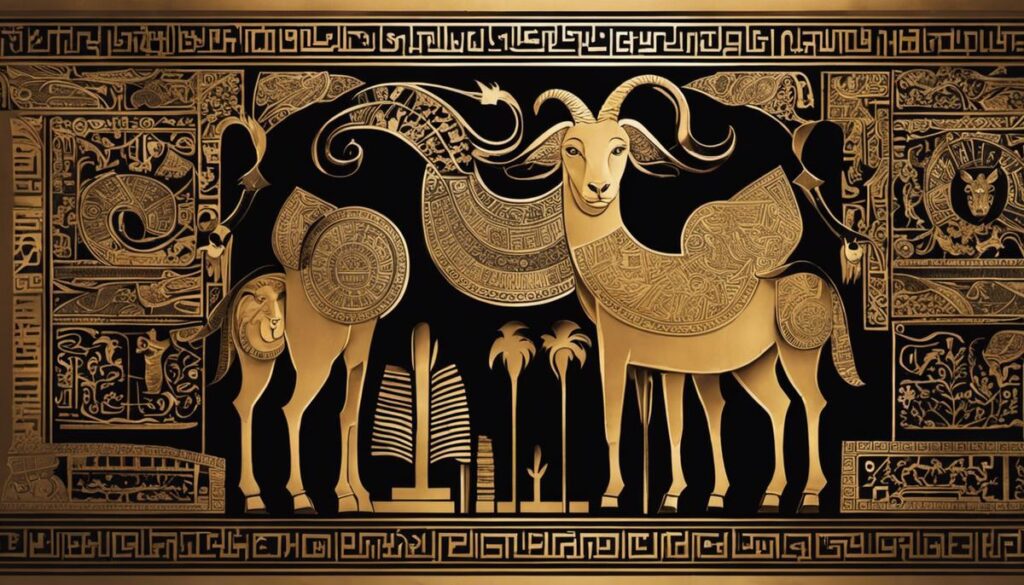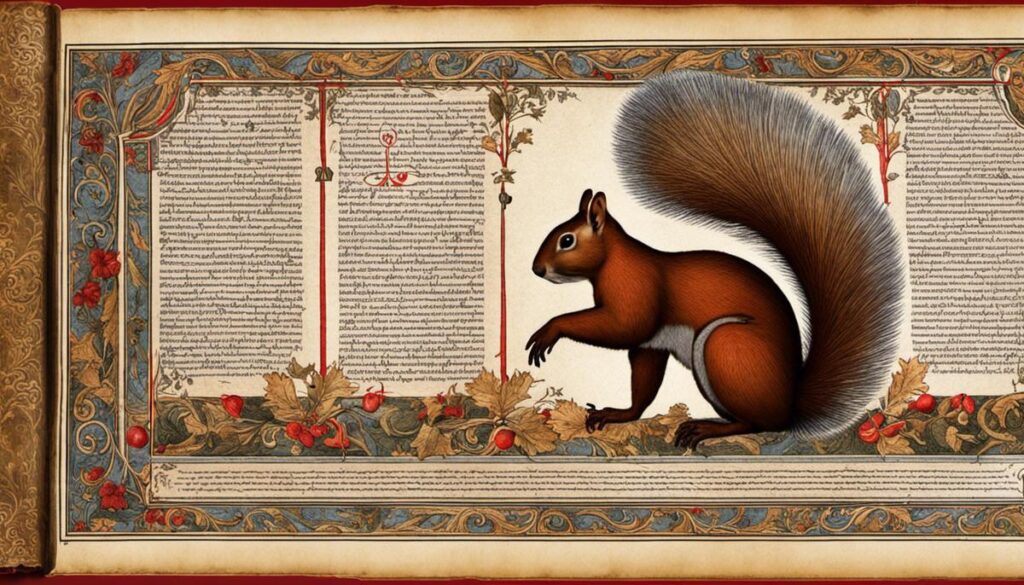Across cultures and centuries, dreams have been perceived as mysterious avenues that potentially hold profound spiritual implications. Predominantly in Christian theology, dreams are sometimes seen as vehicles through which divine messages are communicated. A recurring theme often found in dreams is the lion. This formidable creature is not only fascinating from a zoological perspective but also brimming with profound symbolism in the biblical narrative. Recognizing this, we embark upon an enlightening exploration of the lion symbol in the Bible before translating this understanding into the realm of Christian dream interpretation. Additionally, we dive into the cultural contexts of lion symbols in dreams, with broadening scopes to include global Christian perspectives, followed by a unique interplay of psychological viewpoints on dreams about lions.
Symbolism of Lions in the Bible
The ubiquitous lion, a fascinating creature of formidable stature and strength, represents a symbol of immense power and authority in cultural contexts worldwide. However, its multifarious symbolism in one of the oldest and most widely read documents in human history, the Bible, indeed warrants careful examination and interpretation. While the Bible predominantly portrays the lion as an instrument of divine punishment or a relentless adversary, it inadvertently becomes a metaphor for courage, wisdom, and royalty.
Regarded as one of the largest flesh-eaters in the animal kingdom, lions have been revered by various civilizations for their formidable strength and ferociousness, which, not surprisingly, is echoed in the biblical narrative. Lions, in the Old Testament, signify forms of punishment inflicted by Divine agency. In 1 Kings 13:24, the disobedience of a prophet of Judah culminates into the wrath of a lion. Proverbially, lions denote calamity or adversity, as demonstrated in Proverbs 22:13 and 26:13, where the “street” is depicted as a domain fraught with supposed lions jeopardizing the slothful into inaction.
Lions also renders themselves to allusions in the Bible, not as extant creatures, but rather as characters of demonic identity. Peter’s first epistle (1 Peter 5:8) warns of Satan as a “roaring lion” that prowls, seeking individuals to devour. In this connotation, lions serve as an emblem of the inherent evil that exists in the world, a danger to the innocuous.
However, this exclusively ominous characterization does not encapsulate the full spectrum of the lion’s biblical symbolism. An alternate portrayal positions the lion as a representation of valor and assertiveness. In Proverbs 28:1, the righteous are likened to lions, fearless and undeterred. This courage associated with the symbol of the lion is further underscored in 2 Samuel 23:20 and 1 Chronicles 11:22, where Benaiah’s triumph over a formidable lion echoes his exemplary valor and prowess.
The lion, in biblical symbolism, often represents wisdom. As stated in Proverbs 30:30, “The lion, mighty among beasts, retreats before nothing.” This statement elucidates the sagacity inherent in the demeanor of the lion, reinforcing its status as a symbol of wisdom that allows for calculated dominance rather than ruthless tyranny.
Lastly, the most revered portrayal of the lion speaks to the essence of grandeur and royalty. This is evinced in Revelations 5:5, which refers to Christ as the ‘Lion of the Tribe of Judah.’ The Judah tribe, from which Jesus Christ descends, has biblical ties to this majestic creature that acts as a symbol for the Messiah.
In conclusion, the Bible’s diverse representation of lions, while hinging primarily upon dominant themes of strength and authority, also encompasses symbols of punishment, adversarial forces, courage, wisdom, and royalty. This rich and often contrasting depictions of lions notably aid to punctuate the array of spiritual teachings imbibed in the biblical text.
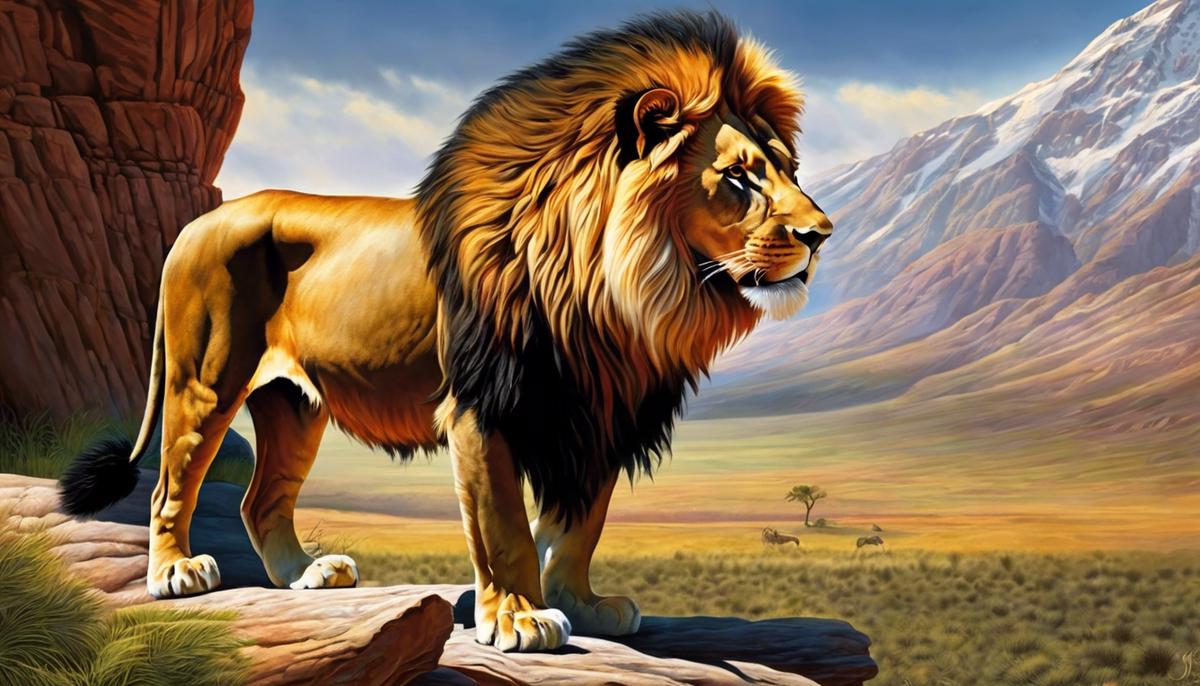
Lion in Christian Dream Interpretation
In the comprehensive analysis of Christian dream interpretation, a seminal role is played by the emblem of the lion. Beyond the already established connotations of strength, assertiveness and royalty, and the distinct symbolism in the Book of Revelations where the lion symbolizes Christ himself, one observes a myriad of nuanced interpretations in Christian dream theory that are indubitably intriguing.
Among these multifaceted interpretations, an essential aspect revolves around the notion of the lion as a harbinger of authority and command. From a theological perspective, dream dalliances with lions may reflect intensified spiritual awareness, indicating that the dreamer is in pursuit of authoritative leadership roles, be it in a spiritual, familial, or career-specific context. This premise roots itself in the Bible where numerous characters, asserted to possessing substantial authority, have been associated with lions.
Alternatively, the apostolic nature of lions in dream analyses cannot be understated as it emanates from the Apostle Peter’s beckoning to be as brave and vigilant as a lion (1 Peter 5:8). Accordingly, dreams incorporating lions can signify a call to holiness and watchfulness, encouraging individuals to adopt the audaciousness of lions in their spiritual journey.
Moreover, the manifestation of a lion may depict spiritual warfare. Notably, the Bible makes references to the devil, depicted as a roaring lion, prowling and seeking someone to devour ( 1 Peter 5:8). This scenario in a dream can serve as a crucial spiritual warning that a battle is looming and a vigilant approach is warranted. Importantly, it serves to accentuate the aspect that dream interpretations should not be viewed through a dichotomy of positive and negative, but rather an appreciation for the providence of cautionary signals or the inspiration towards improvement and growth.
Albeit paradoxical, the lion could also represent God’s protective nature in dreams. Rooting from Psalms 91:13, the scripture states that with God’s help, one can tread upon the lion, suggesting God’s immense protective powers. So, in Christian dream interpretation, such a depiction signifies divine protection from adversity, echoing a sense of comfort and support from higher powers.
Lastly, it is essential to appreciate that individual circumstances and context play significant roles in the deciphering of dream symbols. Engendering personal insights can harness a more accurate understanding of one’s dreams featuring the lion, thus enabling a more profound cognitive and spiritual clarity.
In summary, the manifestation of lions in dreams encompasses an array of interpretations in Christian narration. From authority and aggression to protection and prophecy, the theoretical association of dreaming about lions is as varied as it is profound. Each interpretation emanates from an intricate immersion of historical, cultural, and religious understandings, and serves as a discerning and exciting realm of dream theory within the Christian paradigm.
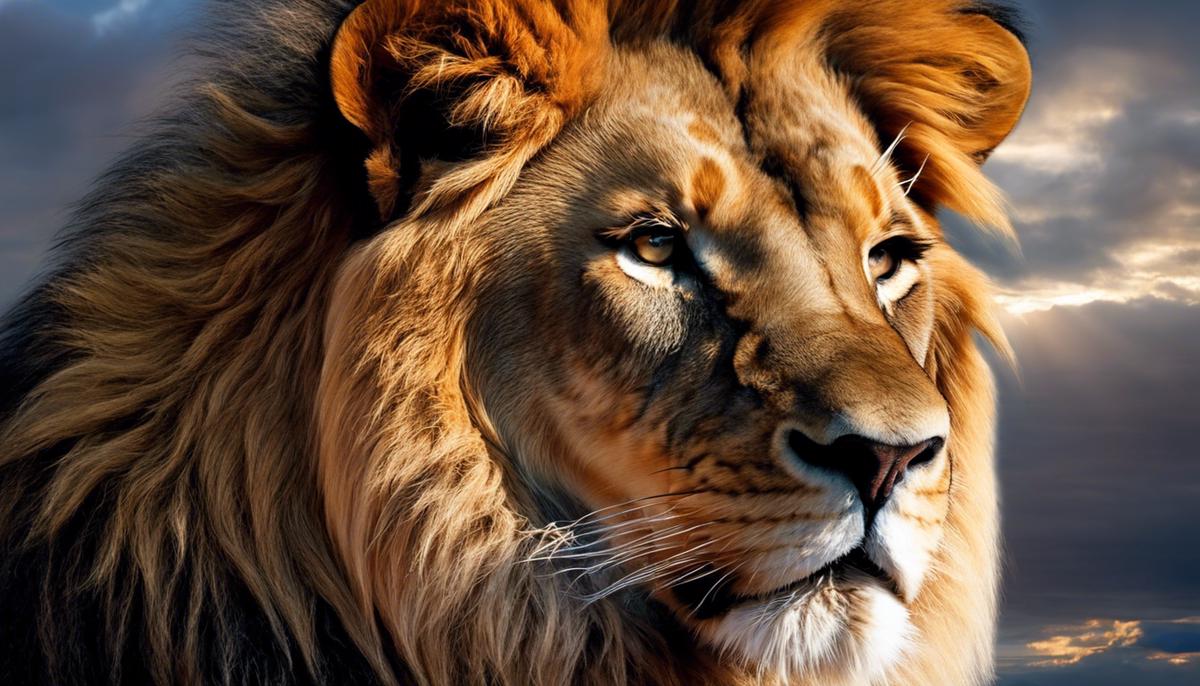
Cultural Context of Lion Symbols in Dreams
Venturing beyond the realms of Christian dream theory, it’s manifest that other cultural contexts significantly contribute to the understanding of lion symbols appearing in dreams. Each culture applies unique filters to dream interpretation, thus moulding it according to its principle values, archaic traditions, and societal norms.
Indigenous African societies, for instance, hold a prominent place for lions in their cultural beliefs. Predominantly, lions represent the spirit of leadership, courage, and personal struggle, reflecting the animistic nature of these cultures. Dreaming of a lion in such societies may be interpreted as an omen of an impending trial or a call to demonstrate exemplary strength and bravery.
On other continents such as Asia, the lion holds a largely protective symbolism. In Buddhist symbolism, lions are often seen as defenders of the law and Buddhism, warding off evil and protecting the truth. As such, if an individual beholds a lion in their dream, it’s commonly seen as a positive sign, suggesting fortification against adversity and spiritual growth.
Venturing into the classical Western world, particularly in Ancient Greek and Roman cultures, the lion’s image boasts the quintessence of nobility, strength, and courage. Pervading both the physical and metaphysical realms, lion symbolism serves as the embodiment of sovereign power and authority. A lion appearing in dreams might be understood as receiving divine strength to face life’s challenges, or an elevation to a position of leadership or authority.
Within the contemporary Western society, facets of commercialism and popular culture have also influenced the conceptualization of lion symbols in dreams. This can be seen in the admiration of the animated character ‘Simba’ from Disney’s ‘The Lion King,’ known for his bravery and righteous path towards regaining his lost kingdom. As such, lions in dreams can represent overcoming hardships and standing up against injustice.
Aboriginal Australians often see the lion as a spiritual guide. In the Dreamtime, a lion appearing in a dream might be interpreted as an ancestral spirit imparting wisdom or guidance. Thus, the lion becomes a symbol of wisdom, courage, and paternal guidance.
In Islamic culture, while specific interpretations may vary among dream interpreters, the lion often symbolises power and strength, but may also embody an oppressive person or a tyrant. Dreaming of a lion might therefore indicate either personal triumph or potential conflict, depending on its context.
Polarized interpretations from various cultural backdrops further highlight the importance of cultural context in understanding lion symbols in dreams. The symbol, fundamentally the same, is re-painted with different strokes on the canvas of diverse cultural perceptions, making the experience of dreaming of a lion a unique encounter for each individual across the globe. The transcultural exchange of symbols and meanings reflects the profoundness of human consciousness, its construct, and powerful potential to transcend the barriers of time and space.
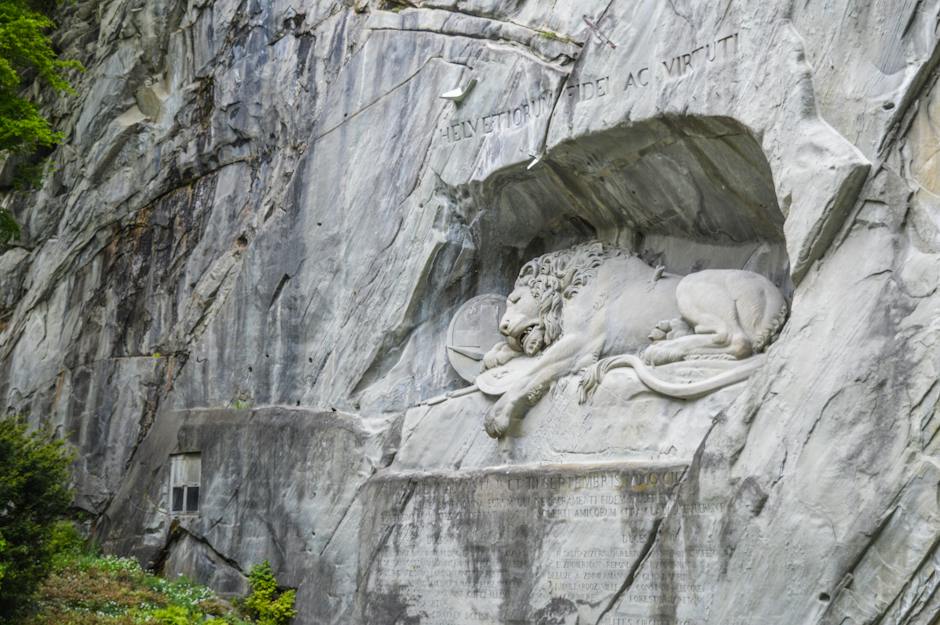
Psychological Perspectives on Lion Dreams
In the realm of psychology, particularly from the perspective of psychoanalysis pioneered by Sigmund Freud, dreams involving lions carry specific significance. In this regard, lions are envisaged as representing suppressed desires and unchecked aggression, underscoring the tension between societal expectations and base instincts. Dreamers are thought to leverage the symbolism of the lion to reconcile these seemingly opposing forces – the fervor of the id and the restraining influence of the super ego.
Jungian psychological perspectives provide a distinctly alternative interpretation, emphasizing the lion as an embodied archetype, a universal symbol ingrained in the collective unconscious. From Carl Jung’s standpoint, dreaming of lions may symbolize a confrontation with the shadow self – the unacknowledged, frequently disowned parts of our psyche. The lion, in this context, invites the dreamer to face and integrate these long-denied aspects of self to achieve wholeness.
Such psychological interpretations align intriguingly with the Proverbs 28:1 biblical quotation: “The wicked flee though no one pursues, but the righteous are as bold as a lion.” Here, the righteous are portrayed as unfearful, embodying the confident and courageous essence synonymous with lions. The alignment among psychological and theological interpretations envisions dreams of lions as conduits for personal evolution – an invitation to embrace a unifying courage and an engagement with intimidating aspects of life and self.
Moreover, the lion as a symbol of spiritual authority and leadership in biblical text mirrors Freud’s and Jung’s portrayal of the lion as symbolic of aspects of personal authority and power; a manifestation of individual will and ambition. This alignment showcases the interplay of psychology and theology while interpreting dreams, further highlighting the nuanced nature of dream analysis.
However, it’s important to underscore the role of individual, cultural, and societal contexts in shaping interpretations. Indigenous African societies, Asian cultures, and even ancient Greek and Roman cultures each touted differing connotations encircling lions in dreams, coloring the symbolic spectrum from protective guardians to omens of ferocity or oppressive ruler-ship. The rampant influence of commercialism and popular culture also muddled these traditional visages of lion symbolism, configuring a kaleidoscope of meaning that warrants in-depth scrutiny.
Finally, it’s prudent to acknowledge that dream symbols and interpretations, while intriguing, are not absolute or predictive. They represent a personal conversation occurring deep within the architecture of our subconscious, a dialog uniquely tailored to each dreamer. Any effort to interpret dreams, including those involving lions, thus requires an appreciation of the dreamer’s personal, cultural, and societal background alongside an understanding of the symbolic connotations involved.
This dynamic tapestry of interpretations, interspersed with psychological, theological, cultural and individual elements, forms a compelling subject for further exploration and research in the realm of dream psychology. The majesty of the lion, a favorite character of our nocturnal narratives, adds to the intrigue, providing a potent symbol for decoding our subconscious aspirations, fears, and unresolved tensions.
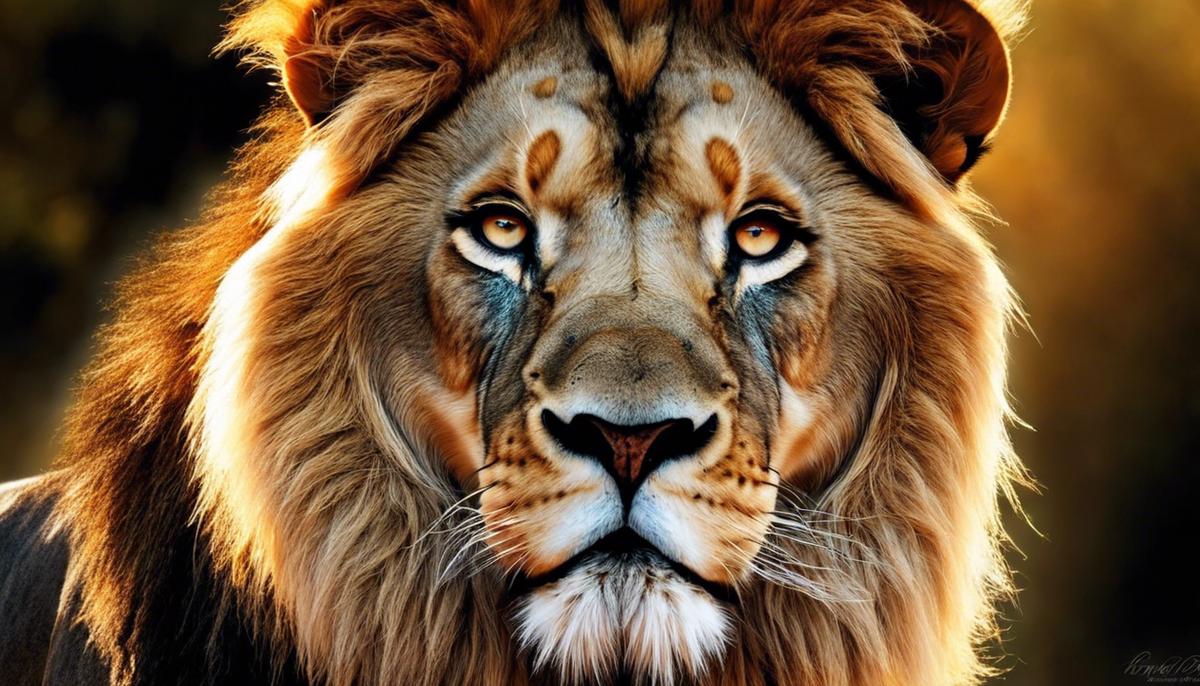
Exploring the intricate tapestry of lions in biblical symbolism and dreams provides us with an enriched understanding of Christian theology, cultural dynamics, and psychological perspectives. The biblical depictions, further reflected in dreams, highlight the lion’s dual nature – epitomizing both regality and ruthless power. Simultaneously, insights from the cultural context of dream symbols prove that geo-cultural factors add richness and depth to one’s understanding of dream interpretations. Furthermore, psychological theories by Freud and Jung offer valuable lenses through which to examine these dreams. Ultimately, this exploration reaches the crossroads of divinity, culture, and psychology, forging a union that enhances our understanding of our own dreams and perhaps the dreams of humanity at large.






